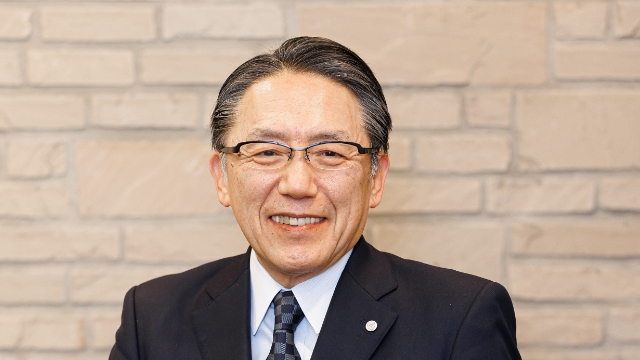
Social Medical Corporation Foundation Tosenkai Keiju General Hospital Director
Masahiro Kanno
Graduated from Nippon Medical School in 1980. 1986 Graduated from Kanazawa University Graduate School of Medicine (Doctor of Medicine). After working as the second surgical assistant at the same university, he became the chief of the surgical department at Keiju General Hospital in 1992, the director of the same hospital in 1993, and has been in his current position since 1995. In recent years, it has also focused on medical DX and is attracting attention as a cutting-edge hospital. He has held important positions such as vice chairman of the All Japan Hospital Association, vice chairman of the Japan Association of Social Medical Corporations, executive director of the Japan Hospital Association, and member of the medical subcommittee of the National Social Security Council.
As the number of elderly patients who require nursing care before hospitalization increases due to the super-aging society, strengthening nursing care capabilities at acute care hospitals has become an urgent issue. Through the efforts of Keiju General Hospital, which established the Nursing Department, we will ask Dr. Masahiro Jinno, the chairman of the hospital, about the key points for strengthening nursing care capabilities, such as the positioning of nursing care workers and the sharing of nursing duties.
According to a survey by the Ministry of Health, Labor and Welfare, about 30% of people aged 75 and over and about 60% of people aged 85 and over need nursing care, and almost the same percentage of elderly people are hospitalized at our hospital. There are quite a few people who need nursing care after being hospitalized, and there is data that about 25% of hospitalized patients aged 75 and over at our hospital will require nursing care upon discharge. However, at present, it is the elderly who are already in need of nursing care even before they are admitted to the hospital that are putting pressure on the practice of medical care, including nursing work in acute wards.
Since several years ago, we have been reconsidering the way acute care is provided to people who require nursing care, as we are no longer satisfied with just treatment as an acute care hospital where lifesaving is the first priority. In many acute care hospitals, including our hospital, we have forced people requiring care to rest in order to give priority to treatment. It is required to prevent impairment of ADL (activities of daily living) as much as possible. The key to this is the nursing care and rehabilitation capabilities of the ward.
Therefore, in September 2022, we established the Nursing Department in order to strengthen our nursing care capabilities. As of May 2011, 43 nursing care workers belong to 10 wards, mainly community-based comprehensive care wards and convalescent rehabilitation wards. In the future, we aim to employ 100 caregivers and operate all wards, including night shifts.

Many acute care hospitals incorporate nursing care departments into their nursing departments and use care workers as nursing assistants. in a relationship. This is because, even if they are in charge of recuperative care in the same way as nurses, the perspective of care workers is different from that of nursing. The purpose of nursing care is to "support life", and we believe that it is very important to make it independent as a department in order to fully demonstrate its expertise even in acute care hospitals.
In the first place, a patient does not switch from being a subject of medical care to being a subject of nursing care on a certain day, but there is a gradation in the degree of need for nursing and nursing care (see diagram).

For example, changing diapers with a tube in place immediately after surgery is a priority stage for treatment, so in order to ensure safety, it is appropriate for a nurse with medical knowledge to handle it. However, in order to maintain ADL, it is desirable for care workers who are good at promoting independence to provide excretion assistance at the stage when the patient's condition has recovered and rehabilitation has become the focus in anticipation of discharge from the hospital. In the nursing field, we try to separate nursing and nursing care into tasks such as diaper changing, meal assistance, and bathing assistance. We need the idea that jobs will be replaced. This separation not only improves medical outcomes (shorter hospital stay, rate of return to home, prevention of need for long-term care, etc.), but also improves patient satisfaction.
In addition, at our hospital, we break down the work related to nursing assistance work and environmental maintenance in detail so that these two occupations can concentrate on highly specialized work. are placed. When recruiting crew members, we also do this work unit, but when we were recruiting as nursing assistants, there were almost no applications, but when we narrowed down the work content and clarified it, many active seniors gathered in search of work.
To sum up, the strengthening of the nursing care capacity of the ward should not be entrusted only to the nursing department. The key to success is creating a system in which expertise is organically linked.
Positioning care workers as professionals has produced various effects, but on the other hand, they have to be treated as nursing assistants in terms of medical fees. However, when nursing care accounts for such a large proportion of acute medical care, it cannot be covered by medical fees alone, and long-term care fees should be included.
The Japanese Council of Hospital Organizations is requesting the government to evaluate nursing care workers in hospital wards in the revision of medical fees in 2024. At our hospital, we would like to focus on establishing the role of nursing care workers in acute care hospitals and creating evidence for this, so that it will lead to evaluation of compensation.